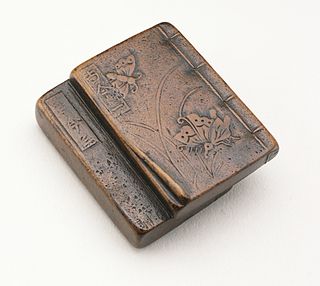The Man'yōshū is the oldest extant collection of Japanese waka, compiled sometime after AD 759 during the Nara period. The anthology is one of the most revered of Japan's poetic compilations. The compiler, or the last in a series of compilers, is today widely believed to be Ōtomo no Yakamochi, although numerous other theories have been proposed. The chronologically last datable poem in the collection is from AD 759 (No. 4516). It contains many poems from a much earlier period, with the bulk of the collection representing the period between AD 600 and 759. The precise significance of the title is not known with certainty.

Year 759 (DCCLIX) was a common year starting on Monday of the Julian calendar. The denomination 759 for this year has been used since the early medieval period, when the Anno Domini calendar era became the prevalent method in Europe for naming years.

Ōtomo no Yakamochi was a Japanese statesman and waka poet in the Nara period. He was one of the Man'yō no Go-taika, the five great poets of his time, and was part of Fujiwara no Kintō's Thirty-six Poetry Immortals.

Japanese poetry is poetry typical of Japan, or written, spoken, or chanted in the Japanese language, which includes Old Japanese, Early Middle Japanese, Late Middle Japanese, and Modern Japanese, as well as poetry in Japan which was written in the Chinese language or ryūka from the Okinawa Islands: it is possible to make a more accurate distinction between Japanese poetry written in Japan or by Japanese people in other languages versus that written in the Japanese language by speaking of Japanese-language poetry. Much of the literary record of Japanese poetry begins when Japanese poets encountered Chinese poetry during the Tang dynasty. Under the influence of the Chinese poets of this era Japanese began to compose poetry in Chinese kanshi); and, as part of this tradition, poetry in Japan tended to be intimately associated with pictorial painting, partly because of the influence of Chinese arts, and the tradition of the use of ink and brush for both writing and drawing. It took several hundred years to digest the foreign impact and make it an integral part of Japanese culture and to merge this kanshi poetry into a Japanese language literary tradition, and then later to develop the diversity of unique poetic forms of native poetry, such as waka, haikai, and other more Japanese poetic specialties. For example, in the Tale of Genji both kanshi and waka are frequently mentioned. The history of Japanese poetry goes from an early semi-historical/mythological phase, through the early Old Japanese literature inclusions, just before the Nara period, the Nara period itself, the Heian period, the Kamakura period, and so on, up through the poetically important Edo period and modern times; however, the history of poetry often is different from socio-political history.

Ōtomo no Tabito was a Japanese court noble, military leader and poet. He is known for his military campaign against the Hayato Rebellion and as the father of Ōtomo no Yakamochi, who contributed to the compilation of the Man'yōshū alongside his father. He served as Dainagon and held the court rank of Junior Second Rank.
Ōtomo no Sakanoue no Iratsume, also known as Lady Ōtomo of Sakanoue, was a Japanese noblewoman and waka poet of the early-to-mid Nara period, best known for the inclusion of 84 of her poems in the Man'yōshū. She was the aunt of Ōtomo no Yakamochi.
Fujiwara no Hamanari was a Japanese noble and poet of the Nara period. He was the son of Fujiwara no Maro, and, according to the genealogy book Sonpi Bunmyaku, his mother was Uneme of Yakami no Kōri, Inaba Province, who is probably the same person who had a famous affair with Aki no Ōkimi. The collection of Japanese poems Man'yōshū does not include his works. With an unknown woman he had a son Toyohiko (豊彦), among other children with other women. The footnote of Sonpi Bunmyaku, however, notes that Toyohiko is actually the grandson of Hamanari. Hamanari achieved the court rank of ju san-mi (従三位) and the position of sangi.
Kakyō Hyōshiki (歌経標式) is a text on Japanese poetics written by Fujiwara no Hamanari. One volume in length, it "is the oldest extant piece of poetic criticism in the Japanese canon".

Waka is a type of poetry in classical Japanese literature. Although waka in modern Japanese is written as 和歌, in the past it was also written as 倭歌, and a variant name is yamato-uta (大和歌).
Prince Yuhara was a Japanese imperial prince and waka poet of the Nara period. He was a grandson of Emperor Tenji and a brother of Emperor Kōnin, but the details of his life, including his birth and death dates, are unknown.
Asada no Yasu (麻田陽春) was a poet in Japan's Nara period who composed both waka and kanshi.
Ōtomo no Sakanoue no Ōiratsume bzw. Ōotome (大伴坂上大嬢) was a Japanese noblewoman and waka poet of the Nara period. Eleven of her poems were included in the Man'yōshū, specifically the ones numbered 581–584, 729–731, 735, 737–738, 1624. She was a daughter of Ōtomo no Sukunamaro and Ōtomo no Sakanoue no Iratsume. Her older half-sister was Ōtomo no Tamura no Ōiratsume and she was a younger cousin and wife of Ōtomo no Yakamochi. Her family background is given in a left note to poem 759 of the Man'yōshū.
Abe no Iratsume was a Japanese waka poet of the Nara period.
Fujiwara no Iratsume was a Japanese noblewoman and waka poet of the Nara period.
Heguri-uji no Iratsume (平群氏女郎) was a Japanese waka poet of the Nara period.
Nakatomi no Iratsume was a Japanese noblewoman and waka poet of the Nara period.